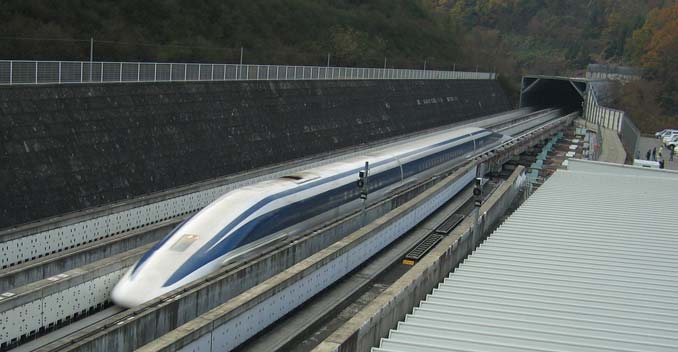Japan's Maglev Train Sets Speed Record by Going 603Km/h

The record saw the Maglev - short for magnetic levitation - cross the 600Km/h mark on a test-run in Yamanashi Prefecture just outside of Tokyo. This comes just days after it broke its previous 12-year-old record of 581km/h by going 590km/h.
The train had 49 Central Japan Railway employees for passengers who are said to be quite happy with the ride quality as it zipped past the 600Km/h mark and managed to stay at that speed for nearly 11 seconds. One must not that the Maglev is different from Japan's Shinkansen bullet train service; the Maglev is not only faster, but it also doesn't exactly travel on the track.
The Maglev hovers 10cm above the tracks, and is propelled by electrically charged magnets; the train starts off running on wheels until they're going fast enough for the magnets to kick in and create the lift. The power needed for levitation is typically not a large percentage of its overall energy consumption, thus making it a very practical option.
However, infrastructure costs will run in the billions. Hence, Japan intends to try and sell its high-speed technology overseas to help rake in some cash. Commercial operation of the Maglev service in Japan will begin by 2027.
How it works:
Japan's Maglev train uses an electrodynamic suspension (EDS) system that is based on the repelling force of magnets. It uses super-cooled, superconducting electromagnets, which can conduct electricity even after the power supply has been cut off.
However, this means the train must first roll on wheels till it attains lift-off speed of about 100Km/h. Japanese engineers say the wheels will come in handy in case of power failure and the consequent system shutdown.
Fact File:
1. Estimated construction cost for Tokyo to Nagoya stretch: $100 Billion
2. 80% of the Tokyo - Nagoya stretch expected to go through tunnels
3. Japan's bullet trains currently take 88 minutes to cover the 286Km-long stretch between Tokyo and Nagoya. Maglev will take 40 minutes
4. Less than a week back Maglev recorded a top-speed of 590Km/h, and broke its own 2003 record of 581Km/h
5. The fastest production car in the world - Hennessey Venom GT - can reach a top-speed of 435.31Km/h
6. Unofficial top-speed achieved by the BAR-Honda Formula 1 team with their 2005 car - 413Km/h
7. The fastest land animal - Cheetah - can attain a top-speed of 120Km/h
8. Theoretically, Maglev can circumnavigate Earth in just under 67 hours
9. Maglev trains don't use engines like the ones found in conventional trains
Trending News
 10 mins readTata Sierra Review: India’s New Favourite?
10 mins readTata Sierra Review: India’s New Favourite?
Latest News
 car&bike Team | Dec 14, 2025Top-Spec Tata Sierra Accomplished, Accomplished+ Prices RevealedRegardless of the powertrain combination chosen, all Tata Sierra Accomplished+ trims cost upwards of Rs 20 lakh (ex-showroom).2 mins read
car&bike Team | Dec 14, 2025Top-Spec Tata Sierra Accomplished, Accomplished+ Prices RevealedRegardless of the powertrain combination chosen, all Tata Sierra Accomplished+ trims cost upwards of Rs 20 lakh (ex-showroom).2 mins read car&bike Team | Dec 13, 2025Skoda Slavia Facelift Spied Testing Again Ahead Of DebutThe facelifted Slavia is expected to debut in 2026 as Skoda-VW India looks to refresh its India 2.0 range.1 min read
car&bike Team | Dec 13, 2025Skoda Slavia Facelift Spied Testing Again Ahead Of DebutThe facelifted Slavia is expected to debut in 2026 as Skoda-VW India looks to refresh its India 2.0 range.1 min read car&bike Team | Dec 13, 20252026 MG Hector Facelift Interior Previewed Ahead Of DebutLatest teaser video of the upcoming Hector facelift suggests minimal cosmetic changes to the interior as well as reveals a new alloy-wheel design.1 min read
car&bike Team | Dec 13, 20252026 MG Hector Facelift Interior Previewed Ahead Of DebutLatest teaser video of the upcoming Hector facelift suggests minimal cosmetic changes to the interior as well as reveals a new alloy-wheel design.1 min read Jaiveer Mehra | Dec 13, 2025Passenger Vehicle, Two-Wheeler Sales Surge In November 2025: SIAMBoth segments reported a growth in the region of 20 per cent, though year-to-date sales growth in FY2026 was notably flatter at around 3 per cent.1 min read
Jaiveer Mehra | Dec 13, 2025Passenger Vehicle, Two-Wheeler Sales Surge In November 2025: SIAMBoth segments reported a growth in the region of 20 per cent, though year-to-date sales growth in FY2026 was notably flatter at around 3 per cent.1 min read car&bike Team | Dec 12, 2025Nissan Entry MPV Design To Be Unveiled On December 18New MPV to be the first of three new models for India by Nissan, alongside the Tekton and a three-row SUV.1 min read
car&bike Team | Dec 12, 2025Nissan Entry MPV Design To Be Unveiled On December 18New MPV to be the first of three new models for India by Nissan, alongside the Tekton and a three-row SUV.1 min read Jaiveer Mehra | Dec 12, 2025New Mini Convertible Launched At Rs 58.50 LakhDrop-top variant of the iconic Cooper hatchback available in a single Cooper S spec.1 min read
Jaiveer Mehra | Dec 12, 2025New Mini Convertible Launched At Rs 58.50 LakhDrop-top variant of the iconic Cooper hatchback available in a single Cooper S spec.1 min read
 Janak Sorap | Dec 11, 2025Harley-Davidson X440 T First Ride Review: Smarter and SharperHarley-Davidson has taken the X440 and given it a more focused and engaging twist. The result is the X440 T—essentially the same platform but updated in areas that give the motorcycle more appeal and riders more thrill.5 mins read
Janak Sorap | Dec 11, 2025Harley-Davidson X440 T First Ride Review: Smarter and SharperHarley-Davidson has taken the X440 and given it a more focused and engaging twist. The result is the X440 T—essentially the same platform but updated in areas that give the motorcycle more appeal and riders more thrill.5 mins read Shams Raza Naqvi | Dec 10, 20252025 Mini Cooper Convertible Review: More Colour On Indian RoadsThe updated Mini Cooper Convertible is set to be launched in the Indian market in the next few days. We drive it around Jaisalmer for a quick review.1 min read
Shams Raza Naqvi | Dec 10, 20252025 Mini Cooper Convertible Review: More Colour On Indian RoadsThe updated Mini Cooper Convertible is set to be launched in the Indian market in the next few days. We drive it around Jaisalmer for a quick review.1 min read Bilal Firfiray | Dec 8, 2025Tata Sierra Review: India’s New Favourite?Marking its return after a few decades, the reborn Sierra has made everyone sit up and take notice. But is it worth the hype?10 mins read
Bilal Firfiray | Dec 8, 2025Tata Sierra Review: India’s New Favourite?Marking its return after a few decades, the reborn Sierra has made everyone sit up and take notice. But is it worth the hype?10 mins read Girish Karkera | Dec 4, 20252026 Honda Prelude First Drive: Domesticated Civic Type RA sporty-looking coupe built to give customers a taste of performance but not at the expense of everyday practicality.5 mins read
Girish Karkera | Dec 4, 20252026 Honda Prelude First Drive: Domesticated Civic Type RA sporty-looking coupe built to give customers a taste of performance but not at the expense of everyday practicality.5 mins read Seshan Vijayraghvan | Nov 29, 2025Mahindra XEV 9S First Drive Review: Big Electric SUV, Bigger ExpectationsThe XEV 9S lands at a time when the EV crowd is growing fast. It’s a big, born-electric, three-row SUV that starts under 20 lakh. It sits close to the XUV700 in size, but the brief is very different. Here’s what it’s like on the road.11 mins read
Seshan Vijayraghvan | Nov 29, 2025Mahindra XEV 9S First Drive Review: Big Electric SUV, Bigger ExpectationsThe XEV 9S lands at a time when the EV crowd is growing fast. It’s a big, born-electric, three-row SUV that starts under 20 lakh. It sits close to the XUV700 in size, but the brief is very different. Here’s what it’s like on the road.11 mins read
































































































































